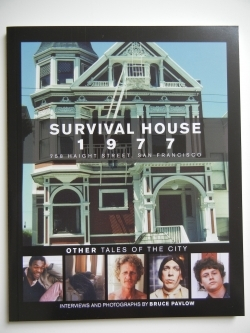Survival House 1977
758 Haight Street, San Francisco
In San Francisco during the late 1970s, Survival House provided housing and social services for homeless gay and transgendered people. Acting as a halfway house, the home offered a supportive community for those who struggled with their sexual identities, or simply had fallen on bad times.
The year photographer Bruce Pavlow chose to produce his stunning collection of photographs and interviews is notable: In 1977, Jimmy Carter became president, Harvey Milk was elected to the San Francisco Board of Supervisors, and Anita Bryant led a successful campaign to repeal gay rights in Dade County, Florida. That same year, the San Francisco Gay Pride Parade saw more than 200,000 people march in protest of the Florida vote.
With these major events as the backdrop for the stories found in Survival House, the interviews feel even more personal and important. Pavlow captures more than a moment in any one individual’s life; he demonstrates the power of a community coming together, and how every person’s story can interlink with so many others.
Most notably, Pavlow shows the effect that a safe, welcoming home can have in helping people through difficult financial and emotional times. Although the interviewees are candid about the house’s challenges—leadership issues, occasional crowding, and food distribution—all appreciate the mission of the organization. That gratitude seems especially heartbreaking, given the house’s brief existence.
Pavlow was a frequent visitor to Survival House between May and June of 1977, when he got to know several residents. Only a year later, the facility closed due to lack of financial resources. He writes, “In 2011, almost thirty-five years later, there is still much homelessness on the streets of San Francisco and other cities. The need for places like Survival House, which served the special needs of the lesbian, gay, and transgendered community, has not diminished in the least.”
The interviews published in Survival House emphasize Pavlow’s point. For example, a resident named Attila notes that he came to the house out of financial need, but also due to loneliness. He says: “I needed someone to talk to. And I think it’s sort of like this is my family now in a way. It’s become like that, you know. The longer you stay with people, the more you get to know them.”
Reviewed by
Elizabeth Millard
Disclosure: This article is not an endorsement, but a review. The publisher of this book provided free copies of the book and paid a small fee to have their book reviewed by a professional reviewer. Foreword Reviews and Clarion Reviews make no guarantee that the publisher will receive a positive review. Foreword Magazine, Inc. is disclosing this in accordance with the Federal Trade Commission’s 16 CFR, Part 255.

